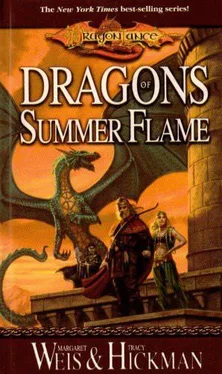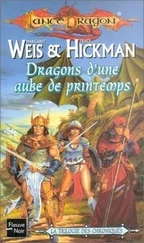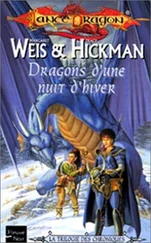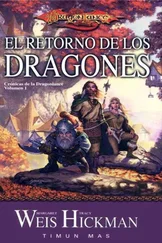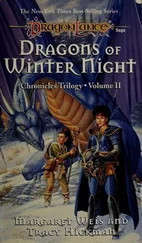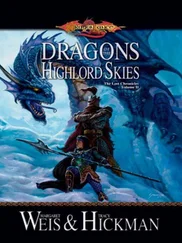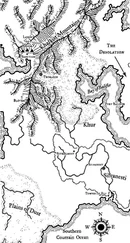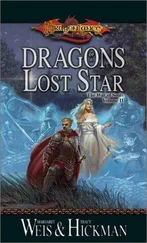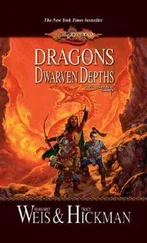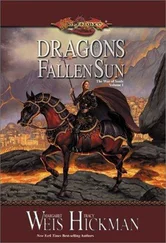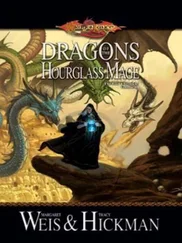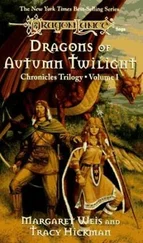Margaret Weis - Dragons of Summer Flame
Здесь есть возможность читать онлайн «Margaret Weis - Dragons of Summer Flame» весь текст электронной книги совершенно бесплатно (целиком полную версию без сокращений). В некоторых случаях можно слушать аудио, скачать через торрент в формате fb2 и присутствует краткое содержание. Жанр: Фэнтези, на английском языке. Описание произведения, (предисловие) а так же отзывы посетителей доступны на портале библиотеки ЛибКат.
- Название:Dragons of Summer Flame
- Автор:
- Жанр:
- Год:неизвестен
- ISBN:нет данных
- Рейтинг книги:4 / 5. Голосов: 1
-
Избранное:Добавить в избранное
- Отзывы:
-
Ваша оценка:
- 80
- 1
- 2
- 3
- 4
- 5
Dragons of Summer Flame: краткое содержание, описание и аннотация
Предлагаем к чтению аннотацию, описание, краткое содержание или предисловие (зависит от того, что написал сам автор книги «Dragons of Summer Flame»). Если вы не нашли необходимую информацию о книге — напишите в комментариях, мы постараемся отыскать её.
Dragons of Summer Flame — читать онлайн бесплатно полную книгу (весь текст) целиком
Ниже представлен текст книги, разбитый по страницам. Система сохранения места последней прочитанной страницы, позволяет с удобством читать онлайн бесплатно книгу «Dragons of Summer Flame», без необходимости каждый раз заново искать на чём Вы остановились. Поставьте закладку, и сможете в любой момент перейти на страницу, на которой закончили чтение.
Интервал:
Закладка:
Dragons of Summer Flame
To Sojourners in Krynn
May your Sword never break.
May your Armor never rust.
May the Three Moons guide your Magic.
May your Prayers be heard.
May your Beard grow long.
May your Life Quest never blow up in your face.
May your Hoopak sing.
May your Homeland prosper.
May Dragons fly ever in your Dreams.
Margaret Weis and Tracy HickmanIn southernmost country
where the Icewall rises
in pale and seasonal sun,
where the legends freeze
in remembered dew and the dawned mercury,
they ready the long vats
in memory’s custom
pouring gold, pouring amber,
the old distillations
of grain, of bardic blood
and ice and remembrance.
And into the waters the bard descends
into gold, into amber
all the while listening
to the dark amniosis
of current and memory
flowing about him,
until the lung, the dilating heart
give way in the waters,
until he fills with listening
and the world rushes into him
deeper than thought, and he drowns
or addles, or emerges a bard.
In the north it is done otherwise:
wisely under the moon
where the phases labor
out of darkness to the light
of coins and mirrors
in abundant freedoms of air.
I heard you were strangers
to the wronged country
where the bards descend,
to the waters where faith
transforms into vision,
to the night’s elixir,
to the last drowning breath
given over to memory
where poetry comes, solitary.
I heard you were strangers
in the merciful north,
that Hylo, Solamnia,
and a dozen unnameable provinces
cleansed you past envy,
past loneliness.
Then the waters told me the truth:
how much you remember your deaths
where the halves of a kingdom
unite in a lost terrain,
how you pass like moons, red and silver,
your destination celestial west,
an alliance of mercy and light.
From the outset the heavens
had this in mind, a passage
through darkness and suspect country,
its vanishing point in sunlight
in the air and the earth’s horizons—
not drowning, nor the harp’s flood.
O you have never forgotten
the bard’s immersion, the
country of sleep,
the time preceding the birth of the worlds
where all of us waited
in the mothering dark,
in the death that the card foretells,
but alone and together you ride
into the dying the dying
the story that means we are starting again...
Book 1
1
The Landing Party. The Prophecy. An Unexpected Encounter
It was hot that morning, damnably hot.
Far too hot for late spring on Ansalon. Almost as hot as midsummer. The two knights, seated in the boat’s stern, were sweating and miserable in their heavy steel armor; they looked with envy at the half-naked men plying the boat’s oars.
The knights’ black armor, adorned with skull and death lily, had been blessed by the high cleric, was supposed to withstand the vagaries of wind and rain, heat and cold. But their Dark Queen’s blessing was apparently not responding to this unseasonable heat wave. When the boat drew near the shore, the knights were first out, jumping into the shallow water, laving the water onto their reddening faces and sun-burned necks. But the water was not particularly refreshing.
“Like wading in hot soup,” one of the knights grumbled, splashing ashore. Even as he spoke, he scrutinized the shoreline carefully, eyeing bush and tree and dune for signs of life.
“More like blood,” said his comrade. “Think of it as wading in the blood of our enemies, the enemies of our queen. Do you see anything?”
“No,” the other replied. He waved his hand without looking back, heard the sound of men leaping into the water, their harsh laughter and conversation in their uncouth, guttural language.
One of the knights turned around. “Bring that boat to shore,” he said unnecessarily, for the men had already picked up the heavy boat, were running with it through the shallow water. Grinning, they dumped the boat on the sand beach and looked to the knight for further orders.
He mopped his forehead, marveled at their strength and—not for the first time—thanked Queen Takhisis that these barbarians were on their side. The brutes, they were known as. Not the true name of their race. That name—their name for themselves—was unpronounceable, and so the knights who led the barbarians had begun calling them the shortened version: brutes.
The name suited the barbarians well. They came from the east, from a continent that few people on Ansalon knew existed. Every one of the men stood well over six feet; some were as tall as seven. Their bodies were as bulky and muscular as humans, but their movements were as swift and graceful as elves. Their ears were pointed like those of the elves, but their faces were heavily bearded like humans or dwarves. They were as strong as dwarves, and loved battle as well as dwarves. They fought fiercely, were loyal to those who commanded them, and—outside of a few grotesque customs, such as cutting off various parts of the body of a dead enemy to keep as trophies—the brutes were ideal foot soldiers.
“Let the captain know we’ve arrived safely and that we’ve encountered no resistance,” said the knight to his comrade. “We’ll leave a couple of men here with the boat, move inland.” The other knight nodded. Taking a red silk pennant from his belt, he unfurled it, held it above his head, and waved it slowly three times. An answering flutter of red could be seen coming from the enormous black dragon-prowed ship anchored some distance away. This was a scouting mission, not an invasion. Orders had been quite clear on that point.
The knights sent out their patrols, dispatching some to range up and down the beach, sending others farther inland, where towering hills of chalk-white rock—barren of vegetation—rose from the trees like cat claws to tear at the sky. Breaks in the rock led to the island’s interior. The ship had sailed around the island; now they knew it was not large. Their patrols would be back soon.
This done, the two knights moved thankfully to the meager shadow cast by a squat and misshapen tree. Two of the brutes stood guard. The knights remained wary, watchful, even as they rested. Searing themselves, they drank sparingly of the fresh water they’d brought with them. One of them grimaced. “The damn stuff’s hot.”
“You left the waterskin sitting in the sun. Of course it’s hot.” “Where the devil was I supposed to put it? There was no shade on that cursed boat. I don’t think there’s any shade left in the whole blasted world. I don’t like this place at all. I get a j queer feeling about this island, like it’s magicked or something.” “I know what you mean,” agreed his comrade somberly. He kept glancing about, back into the trees, up and down the beach. All he could see were the brutes, and they were certainly not bothered by any ominous feelings. But then they were barbarians. “We were warned not to come here, you know.”
“What?” The other knight looked astonished. “I didn’t know. Who told you that?”
“Brightblade. He had it from Lord Ariakan himself.”
“Brightblade should know. He’s on Ariakan’s staff, though I hear he’s asked to be transferred to a fighting talon. Plus Ariakan’s his sponsor.” The knight appeared nervous, asked softly, “Such information’s not secret, is it?”
The other knight appeared amused. “You don’t know Steel Brightblade very well if you think he would break any oath, pass along information he was told to keep to himself. He’d sooner let his tongue be ripped out by red-hot tongs. No, Lord Ariakan discussed things openly with all the regimental commanders before deciding to proceed.”
Читать дальшеИнтервал:
Закладка:
Похожие книги на «Dragons of Summer Flame»
Представляем Вашему вниманию похожие книги на «Dragons of Summer Flame» списком для выбора. Мы отобрали схожую по названию и смыслу литературу в надежде предоставить читателям больше вариантов отыскать новые, интересные, ещё непрочитанные произведения.
Обсуждение, отзывы о книге «Dragons of Summer Flame» и просто собственные мнения читателей. Оставьте ваши комментарии, напишите, что Вы думаете о произведении, его смысле или главных героях. Укажите что конкретно понравилось, а что нет, и почему Вы так считаете.
